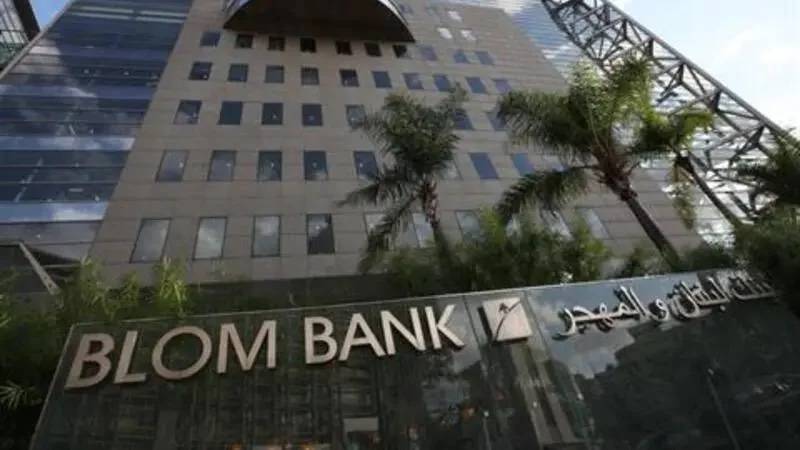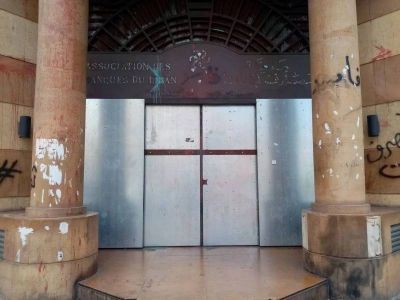
A branch of BLOM Bank in Beirut. (Credit: AFP archive photo)
In the absence of reforms that could end the unprecedented financial crisis that has been facing Lebanon for three and a half years, commercial banks and depositors continue their head-to-head battle.
The Order of Engineers and Architects in Beirut, which has some of its deposits at the Banque du Liban et d'Outre Mer (BLOM Bank), filed a motion on Monday with the Beirut urgent matters judge, challenging the bank’s decision to close its accounts and pay out the funds held in them in banker's checks deposited with a notary public. However, this means of payment is disadvantageous to the customer, as because banks in most cases refuse to cash checks, check holders typically now sell their checks in the market and can generally only hope to get 10 to 20 percent of their value.
“The measures were taken by the bank on Friday in response to our request to withdraw part of our assets, which constitute the retirement pensions and the hospitalization fund,” the order’s president, Aref Yassine, told L’Orient-Le Jour.
“Within the 48 hours of the legal time limit given to us, we rejected the checks and immediately requested that [the bank] reopen our accounts through judicial channels,” he added. The order intends to file another motion to have these funds returned to the accounts that they seek to reopen, he said.
“The fruits of the savings [we] amassed over many years, our assets at BLOM and other banks, have been confiscated, instead of allowing the order’s members to lead a dignified life,” Yassine said.
“Our confrontation with the banks will continue through all legal means, as well as through the mobilization of engineers and the pressure they are able to place,” he added.
Yassine noted that the order faced the same problem with Fransabank last year. In June, the order won its case, following a lawsuit it had filed against Fransabank, which was required by the court to reopen the account it had closed.
Unifying criteria
Speaking to L’Orient-Le Jour, an executive at BLOM Bank justified the measures, saying that there is a “need to have a unified criterion for the repayment of loans and the payment of deposits.”
“It is unfair for the banks to return deposits in fresh dollars [in cash], while many of the loans were repaid based on the old parity of LL1,500 [to the US dollar],” he said.
Lebanon’s national currency has lost more than 96 percent of its value on the parallel market since the onset of the country’s financial crisis in 2019. The state earlier this year devalued the lira from the LL1,500 peg to the US dollar in place for more than 25 years to LL15,000 to the dollar; however, as of Wednesday morning, the lira was trading at more than LL100,000 to the dollar on the parallel market.
“Meeting the demands of this or that depositor will prevent the banks from having enough liquidity to return the assets of all depositors,” he argued, adding that “the banks, just like the depositors, are victims of the state’s negligence.”
A lawyer familiar with the case said that the bank could better defend itself if it had simply deposited the checks with a notary public without going so far as to close the accounts.
“It is better to reopen the order’s accounts, because a bank account closure is an infringement of rights, and this act is within the absolute jurisdiction of the judge of urgent matters,” he said, estimating that the bank could ultimately opt to take this course.
He added that “the judge of urgent matters could rule against the bank, including to force it to pay its customer in fresh dollars.”
However, while keeping the account open, a check can [still] be deposited with a notary, the lawyer said. Such a case is within the jurisdiction of the civil courts, where longer proceedings are to the advantage of the banks, he added.
Fraudulent bankruptcy
While the banks are trying to resort to legal means to serve their interests, the depositors’ legal representatives are also doing so to preserve theirs.
On behalf of a BLC customer, Pascal Racy, the Moutahidoun collective filed a lawsuit on Tuesday before the Beirut First Investigative Judge Charbel Bou Samra for “fraudulent bankruptcy or negligence bankruptcy” against BLC, represented by its CEO, Nadim Kassar, in his personal capacity, and by other bank executives, also in their personal capacities.
A criminal attorney, commenting on the difference between a bankruptcy case before the civil court and a fraudulent bankruptcy case before the criminal court, said that in both cases, the bank managers, if found guilty of mismanagement, could be held personally liable and have their personal assets and properties confiscated. Yet, in cases of fraudulent bankruptcy, they may be subject to criminal sanctions, he said.
This article was originally published in French in L'Orient-Le Jour. Translation by Joelle El Khoury.

